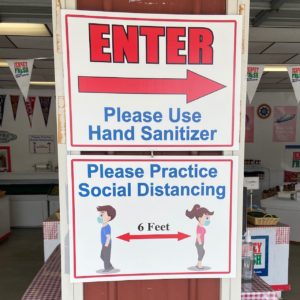The COVID-19 pandemic has highlighted the critical, indeed essential, role of farm labor in getting food from farm to plate. However, health concerns should not stop with a negative COVID test, especially if an employee or family member is exhibiting any of the ‘flu-like’ symptoms that are associated with corona virus.
A recent farm call was a reminder that working outside, especially during this July heat wave, exposes workers to a number of potential health risks that may present very similar symptoms and can be equally health, and even life, threatening. Recently published studies from the Rutgers Institute of Earth, Ocean, and Atmospheric Sciences suggest growing numbers of people worldwide are at risk of heat stress and related complications, including farmers and ag laborers working in high heat and humid conditions.
Harvesting and other activities along field edges, including going into the woods instead of using a portable bathroom facilities, also lead to a high risk of tick bites, which can also carry a number of diseases, many as or more debilitating than Lyme disease that most are now aware of. A recent story at Today.com suggested that the COVID-19 pandemic might lead to more tick-borne disease this year, quoting Rutgers entomologist and assistant professor Alvaro Toledo at the Center for Vector Biology with suggestions how to prevent tick bites.
It is critical for your employees’ health and well-being to get proper diagnosis and treatment for all of these ailments. This table illustrates how many tick-born diseases, as well as heat stress, all have potential symptoms very similar to those of COVID-19. Each is linked to additional resources at the CDC. In many cases, it may be the ‘other symptoms’ that may be unique to each disease and assist a medical practitioner with correct identification and lead to better verification with further testing.
|
Disease > Symptoms v |
COVID-19 | Heat Stress | Lyme Disease | Ehrlichiosis | Babe- biosis | Powas-san | Rocky Mtn Spotted Fever |
| Vector* | Human | Black-legged Tick (a.k.a. Deer Tick) (I. scapularis) | Lone Star Tick (A. americanum) & Black-legged | Black-legged Tick | Ground hog(I. cookei), Squirrel (I. marxi) & Black-legged Ticks | American Dog Tick (D. variabilis) | |
| Fever or chills | X | X | X | X | X | X | X |
| Cough | X | X | |||||
| Shortness of breath/difficulty breathing | X | ||||||
| Fatigue | X | X | X | X | |||
| Muscle/body aches | X | X | X | X | X | X | |
| Headache | X | X | X | X | X | X | X |
| New loss of taste or smell | X | ||||||
| Sore throat | X | ||||||
| Congestion or runny nose | X | ||||||
| Nausea/vomiting | X | X | X | X | X | X | X |
| Diarrhea | X | X | |||||
| Rash | X | X | X | ||||
| Other symptoms | X | X | X | X | X | X | |
| Potentially Deadly/Disabling |
X | X | X | X | X | X | X |
*NOTE – main vector listed, but many tick born diseases may be vectored by other species of ticks, or different species causing same disease may be carried by different tick species.
 Farmer Panel: Tracy Duffield-Duffield’s Farm Market, Dave Specca- Specca’s Pick-Your-Own Farm and Jess Niederer – Chickadee Creek Farm and CSA will discuss what they have changed on their farms due to COVID-19.
Farmer Panel: Tracy Duffield-Duffield’s Farm Market, Dave Specca- Specca’s Pick-Your-Own Farm and Jess Niederer – Chickadee Creek Farm and CSA will discuss what they have changed on their farms due to COVID-19.